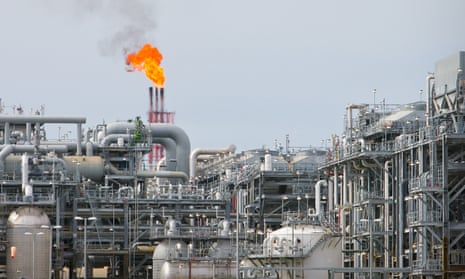The competition watchdog has begun a crackdown on “greenwashing” by Australian companies, surveying the internet for companies making false claims about environmental action after a global investigation found as many as 40% may be fraudulent.
Gina Cass-Gottlieb, chair of the Australian Competition and Consumer Commission, told a House of Representative hearing on Tuesday that “increasingly large proportions of consumers” were making decisions based on products’ sustainability credentials.
“We do not want to see a loss of consumer and community trust in these claims because it is a critical part of the purchasing decisions of consumers,” she said, adding “we get an unfair competitive situation” if firms falsely make claims about achieving net zero carbon emissions or other environmental standards.
Ensuring claims are truthful will be an enforcement priority for the ACCC this year, and an enduring one, Cass-Gottlieb said, adding international estimates from consumer protection groups put the level of false environmental claims at 40%.
Staff have begun “a significant body of work here”, including a sweep of the internet starting last week to identify claims that “set off alarm bells for us”, she said.
The ACCC is also planning to lay down guidelines so that companies only make statements about their products that are “clear, defined, limited in their claims, and always have strong verification materials”, Cass-Gottlieb said. “Scientific and rigorous processes” would need to be behind those claims.
Scrutiny of the companies’ climate credentials, including the validity of Australian carbon credit units (Accus), is likely to intensify in coming months.
The Albanese government has launched an independent review of the credits and the Clean Energy Regulator that will report by the year’s end. On Monday, it also released draft regulation that will open up a new type of credits linked to reductions of carbon emissions by industrial facilities covered by the so-called safeguard mechanism.
Jerome Laxale, Labor MP for Bennelong, welcomed the ACCC’s plans to clamp down on greenwashing.
“It’s a huge indicator of what tough work our regulators need to do to ensure that 40% of net zero claims here in Australia are not fraudulent,” Laxale told Guardian Australia.
“We’ve got a lot of catching up to do,” Laxale said. “It’s great to start this year, but it also would have been better if they had started earlier.”
“I want to ensure that when a company claims that they are net zero that either, A, they are actually reducing their emissions, or B, that the offsets that they purchase are legitimate and not junk,” he said.
The ACCC has emphasised the importance of businesses using trusted certifications to make environmental claims and that it is working with other Australian regulators to address greenwashing. But what happens when these “trusted” certification schemes or regulators themselves are making misleading claims?
Polly Hemming, a senior researcher at the Australia Institute, said it was “very hard to see how Australian regulators can effectively tackle greenwashing if they can’t get to the root cause”.
“That is, other regulators or arms of government rubber-stamping dodgy offsets or misleading carbon neutral claims,” she said. “In Australia gas companies can literally say they are a carbon-neutral-certified organisation because they have offset the emissions from their offices.”
Hemming said the 40% estimate of fraudulent claims could be higher in Australia given the relative absence of transparent climate reporting requirements and government frameworks that actually encourage businesses to offset a small fraction of their emissions while expanding emissions elsewhere in their business.
after newsletter promotion
Cass-Gottlieb said the ACCC’s only action to date against greenwashing, involving a company claiming its wipes were flushable, had failed. A separate case against Volkswagen for its false emissions claims, was a success.
“It’s enough to say a claim is based on a standard or guidelines or some sort of certification without knowing if that standard is robust,” Hemming said.
The ACCC’s action against the wipes had failed because the respondent relied on “independent” guidelines to substantiate the flushable claims.
“You could see with your own eyes that these wipes were choking up sewers – they pulled seven metres of them out of a Queensland sewer,” Hemming said. “It’s absurd when physical evidence has no weight in these matters.”
Laxale later pressed the Australian Prudential Regulation Authority about whether they consider companies found to be greenwashing might face legal risks.
Sean Carmody, an executive director at APRA, said its emphasis had been the “consistency and clarity” of company disclosures. “Greenwashing could be one of the litigation risks,” he said.
Officials said it was up the clean energy regulator to supervise the integrity of carbon credits.
Officials from the Australian Securities and Investments Commission (Asic) said they too were planning to step up anti-greenwashing action.
“[W]e’ve got a number of investigations in relation to allegations of greenwashing and the kinds of things that we’re looking at involve potential misleading or deceptive conduct,” Sarah Court, a deputy Asic chair said. “There [are] listed entities, superfund trustees, and one managed fund responsible entity” in the early stages of investigation.
“So [we’re] looking at statements like claims about wanting to achieve net zero emissions by a particular time, claims about carbon neutrality, claims about an emissions reduction strategy,” Court said, adding there was also the “broad area” of products claiming to screen out certain investments.
Karen Chester, another deputy Asic chair, said that by 2025 about a third of assets under management globally, worth some $53tr, would be covered by ESG – environmental, social and governance – standards.
“We’ve been calling out greenwashing for a while,” Chester said, adding that it was “a whole of Asic priority now”.
